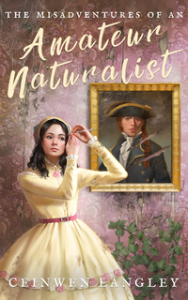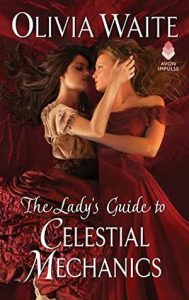Amazon Affiliate Link | Bookshop.org Affiliate Link
If you think about it, “Beauty and the Beast” is a fairy tale that can really apply to the queer experience. Being shunned by society, finding love that the people around you view as monstrous, and forming your own life outside of the norm is something that most LGBT people can relate to. In The Misadventures of an Amateur Naturalist, Ceinwen Langley makes this metaphor literal and does it extremely well. If you’re looking for a great new indie read, this book is for you.
In 18th-century France, the titular amateur naturalist, a young woman named Celeste, is torn between saving her family by marrying a man she knows she will never love or following her dream and passion of observing the world’s creatures to expand scientific knowledge. However, as she sets off on her adventure, she realizes that she cannot make it on her own. After seeking shelter in what appears to be an abandoned castle, she discovers a previously unknown creature. Befriending and studying this beast could be her last hope of survival.
One thing that this book does really well is establish characters and motivations. Celeste, her family, and everyone in her French village feel like truly well-rounded, unique individuals. I have a soft spot for nerdy protagonists, and Celeste’s love of science and animals really warmed my heart. The conflict she felt between marrying a man and securing social acceptance but not being happy and not marrying a man but being a social outcast was very authentic. Even the supporting characters felt well-rounded, which is notable because it would have been very easy for Langley to slip into lazy, one-dimensional villains.
The only thing I didn’t like about this book was the pacing. Setting up Celeste’s backstory and family was really important, but in my opinion, it took up too much of the book. Because this is such a short novel, I think the pacing might have been better if Celeste set out on her adventure earlier on in the story. In general, I also wish the story was longer. The ending definitely set up a sequel, which I would love to see, but I also could have done with more story in this installment.
Longer length would have also given the story more time to build on another aspect I thought it did really well: actually take into account the historical context of the time. Most fairy tales and, by extension, fairy tale retellings, seem to exist out of time. This book does not do that. The Misadventures of an Amateur Naturalist tackles head-on the rampant sexism of 18th-century France, and the very real impacts that would have on a female character. Seeing Celeste and her family and friends struggle to find joy and individuality in a society that tried to force them into being heterosexual wives and mothers was heartbreaking and compelling at the same time. More books should follow in these footsteps and actually grapple with what it would have been like for a spirited female protagonist to exist in a past that tried so hard to limit them. I truly commend Ceinwen Langley for doing so.
The Misadventures of an Amateur Naturalist was published on September 1st, 2021. Grab your copy if you want the sapphic, feminist fairy tale of your dreams. Thank you to the author and Netgalley for providing me with an advanced copy in exchange for an honest review.



